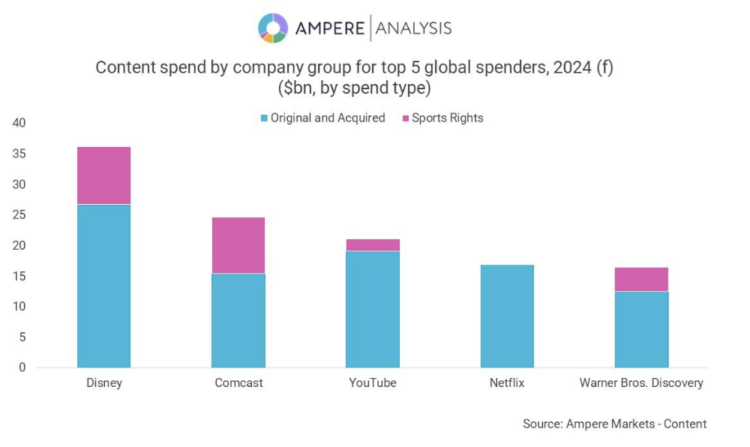You can’t compare YouTube with Netflix: Media’s risk conundrum

Opinion: 100% Media 0% Nonsense
Ignoring and trying to eliminate risk creates strange media viewpoints and threatens what makes this industry successful in the long term, writes the editor-in-chief.
“News is substitutable.”
This is one of the stupidest sentences I’ve ever read in an official statement by a tech company. Which is good timing, as we’re about to hit the five-year anniversary of that S1 SEC filing by WeWork before it went public.
Meta, an obscenely successful tech business that is not known for employing dummies, put together this bizarre string of words to an Australian parliamentary inquiry as part of an ongoing fight against plans to make Facebook and Instagram pay media companies for the news content they monetise with ads on its platforms.
It’s so idiotic that there’s a kind of wretched beauty to it. Just imagine the mental gymnastics required to satisfy the idea that you can replace like for like a form of content that is, by definition, new information about what is going on in the world.
Of course it benefits Meta to downgrade “news” as just another form of user-generated content as it seeks to evade content carriage costs. As usual, a tech platform is trying to claim all the privileges that might be afforded to a publicly owned asset while privatising all the benefits for its shareholders.
But there’s a deeper issue with seeing any form of content being fungible. Especially for those in the “platform” business.
Content is often wrapped in uncertainty
Content, the heart and soul of media, is the definition of a “high risk, high reward” venture.
As I wrote last week, we can begin to define media “quality” not just by the outcomes it has on audiences, but also by the manufacturing process required to publish and distribute it.
It takes a huge amount of skill and expertise to publish a book that people will actually take the time to read — and so it is of immensely higher “quality” than a stream of tweets about Gareth Southgate’s ability as an England football manager after the team lost to Spain in the Euro 2024 final.
News requires professional journalists to collect, check and curate information. Part of what makes social media so appealing is that natural human urge to share news and see what others think of it.
While that makes us all “journalists” in a sense (we’re all writing and publishing online), there is a chasm of difference between someone commenting on the assassination attempt on Donald Trump and a news journalist who was at the scene reporting on which directions the bullets flew.
Risky business
And there’s one huge, important component to that delta between news and other content that is strangely not talked about enough.
Risk.
Content creation is a risky business.
It’s risky to employ journalists, movie directors, publicists and ad agency copywriters to create stuff that will go out into the world without a guarantee that it will be commercially successful.
Sometimes it’s so risky that you might defame someone or break a law — and even then you might decide the value of content is worth whatever sanction awaits. Ask Salman Rushdie.
I’m taking a risk right now. Will anyone read this column? Will anyone care? Will anyone share it or comment on it?
You can’t compare YouTube and Netflix
This industry regularly fails to understand this and it creates a bizarre picture of how we see the media world.
Just yesterday I was sent a peculiar press release from Ampere Analysis that gushed about YouTube’s “unique business model”. Ampere decided to compare YouTube’s investment in content with the world’s major movie studios and streaming services.
YouTube is third, apparently, behind Disney and Comcast, and ahead of Netflix and Warner Bros Discovery.
This might seem odd: can you think of a single original content deal that YouTube has struck? What sorcery has taken place to make YouTube a bigger content investor than Netflix, which spent $6bn last year in the UK alone?

Read the small print and the magicians’s secret is revealed: “YouTube’s content spend, consisting of its distinct revenue-sharing arrangement with content creators, will rank as the second-largest non-sports content spend globally in 2024, behind Disney.”
This is not quite as stark a switcheroo as “news” for “user-generated content”, but it comes close.
Avoiding risk is a bad strategy
There is little risk for YouTube.
It’s a model in which it only pays content creators when they have a lot of subscribers (at least 1,000) and it pays them a percentage of ad revenue for any spots viewed. It’s a video-sharing monopoly: almost no content creator is big enough to negotiate a deal in which YouTube has to take on any risk by paying someone upfront to ensure they don’t go elsewhere.
That’s what makes Meta and Google inherently conservative businesses: their entire operations are built on selling advertising with as low risk as possible.
This is not standard media practice.
Artistic content is even more risky than news because creativity can be unpredictable. Media, which monetises these art forms, has always had to bear a high risk premium, whether it’s a movie studio, a publishing house or a TV network.
Indeed, one of the unfortunate trends of audience fragmentation has been a rise in risk aversion. That’s why we’re saturated with superhero movies, franchise reboots and reality-TV formats.
That’s an obvious short-term strategy for executives who need to survive another year, but it does nothing to secure the long-term future of media as a creative powerhouse.
Risk is not ‘substitutable’
We need risk-takers.
Whether it’s news publishers that are prepared to invest in journalism that properly holds institutions to account or TV companies that are willing to let screenwriters and directors push boundaries.
Mega platforms like Facebook and YouTube rely on this, too, for their long-term survival, whether they care to admit it or not.
 Omar Oakes is editor-in-chief of The Media Leader.
Omar Oakes is editor-in-chief of The Media Leader.
100% Media 0% Nonsense is a weekly column about the state of media and advertising.
Mark Read in conversation with Elon Musk? There’s only 1 question worth asking him




